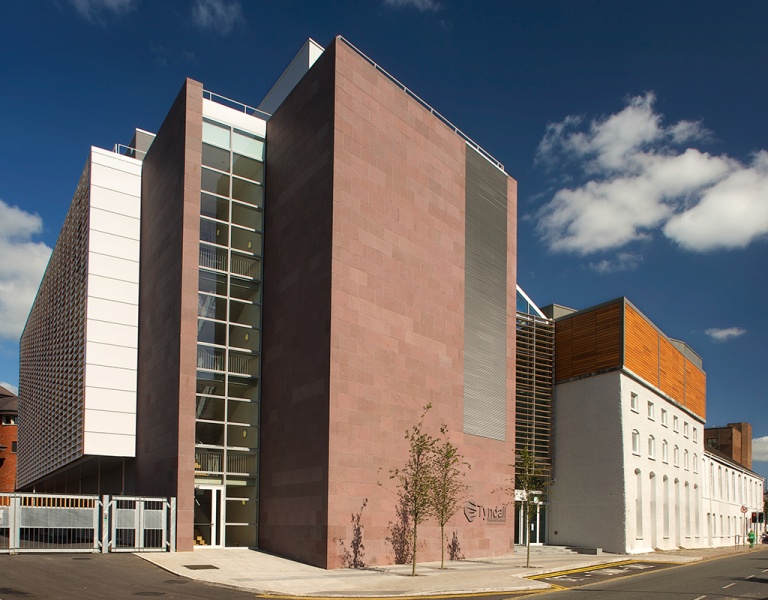Tyndall National Institute lowers carbon emissions and energy costs
Tyndall National Institute used the EXEED process to identify significant energy savings across its buildings, which will result in an energy saving of 3.6GWh.
Key achievements
Full engagement obtained from the wider team including both facilities and operations personnel.
Commitment obtained from the leadership team to progress to EXEED Stage 2 due to the extensive co-benefits from the projects identified as well as the energy, carbon and cost savings.
Project background
Tyndall National Institute is a research flagship of University College Cork (UCC) and a leading European deep-tech research centre in integrated Information and Communications Technology (ICT) materials, devices, circuits and systems.
Tyndall is Ireland's largest Research and Technology Organisation (RTO) specialising in both electronics and photonics. It is also home to a multidisciplinary research community of over 600 people of 52 nationalities.
Buildings within this boundary range from the 1800s to 2008. Building renovations and upgrades have occurred over the years, including the recent Phase 3 renovation of a 120-year-old kiln building to a BER A3 rating which won the SEAI Energy Award for Energy in Buildings in 2021.
These buildings include a wide range of space types such as Class 4, 5, 6 & 7 cleanrooms, as well as multifunction lab spaces and offices. For this reason, the energy intensity of this building is far higher than that of a standard office or educational facility.
The project
Tyndall implemented SEAI's Excellence in Energy Efficiency Design (EXEED) process to gain a greater understanding of its buildings' energy use, potential improvements, and savings.
"We saw the EXEED programme as an opportunity to develop a long-term decarbonisation strategy for the institute. With buildings dating back to the 1800s, and with a highly complex range of space uses, from cleanrooms to laboratories, we needed to ensure a robust and structured approach to carrying out a deep dive energy audit. The EXEED model was seen as an ideal fit for this," said Derry Kelleher, Facilities Manager, Tyndall Institute.
This project aimed to assist Tyndall in achieving their decarbonisation goals through an efficiency first approach. They wanted to challenge the operation of the systems before determining any solutions which required a high capital spend. This included the challenging of space conditions, review of building fabric performance and condition, review of management process, and review of the utilities services and production equipment across the institute. "No stone was left unturned during the Stage 1 audit," explains Derry.
The EXEED process
The Stage 1 EXEED process assisted Tyndall in identifying 123 opportunities for improvement across our significant energy users. Most of these opportunities aimed to reduce demand across the site, predominantly through operational control and optimisation of energy use.
Energy projects have been grouped into an implementation plan for Stage 2 of the EXEED process, which will be carried out in the following order:
- Operational Control Improvements,
- Low/Medium Cost Demand Reduction Projects,
- Capital Cost Decarbonisation Projects.
The final piece of the puzzle includes the installation of heat pumps for heating and cooling, but only after the energy demand has been reduced.
The opportunities which were identified will result in an annual energy saving of 3.6GWh.
"We have ISO50001 in place so regularly carry out energy audits. The EXEED process went a layer deeper and allowed us to identify a broad scope of energy saving opportunities. The Challenge & Analyse process really made us dive deeper into areas that we would not usually have spent much time," said Derry.
"The race to decarbonise seems to be largely driven towards complex and costly technological solutions. Through the EXEED process we aimed to minimise this cost and complexity by challenging our existing systems, processes and equipment. Overall, this process has been a success, and has put us on a credible pathway to decarbonisation well in advance of our public sector obligations. I'd highly recommend the EXEED process to any organisation who is looking to get a much deeper understanding of their energy use."
What's next?
Tyndall Institute has since gone through the EXEED Stage 2 application process and has received a letter of offer for the implementation of capital projects. They will progress with these projects through to October 2024.
